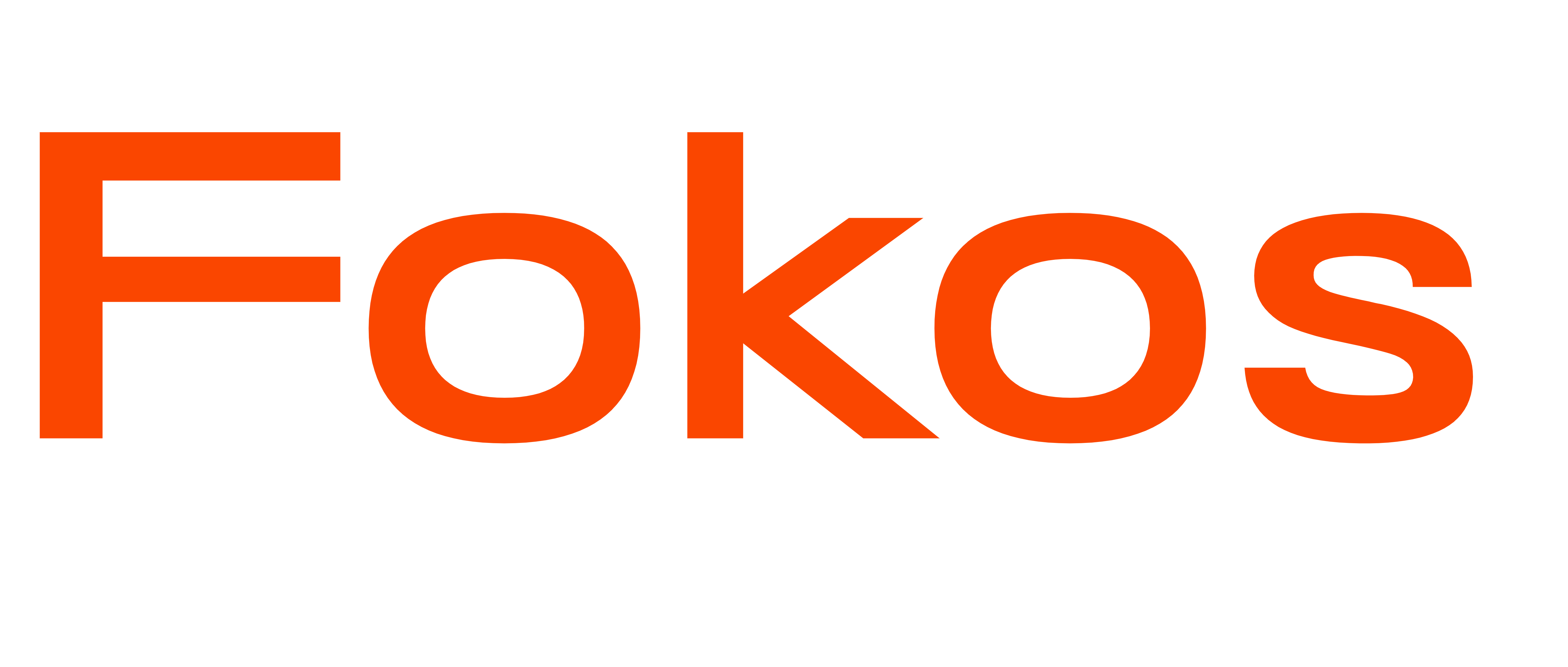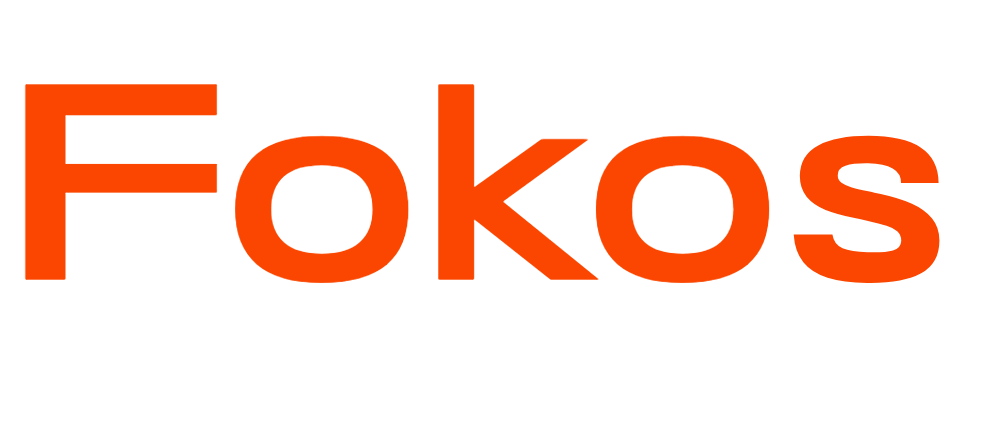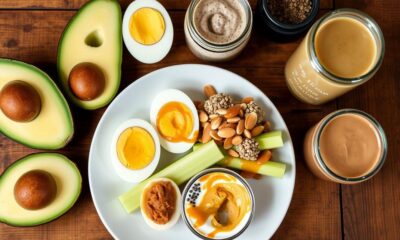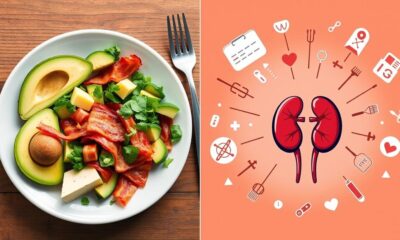Nutritional Information
Unlocking Essential Nutrients for Keto Success
Incorporating essential nutrients is crucial for keto success; discover how to optimize your diet and uncover strategies for lasting results.

Releasing essential nutrients is fundamental to your keto success. You'll need to focus on healthy fats, quality proteins, and fiber-rich foods to fuel your body effectively. Don't overlook electrolytes like sodium, potassium, and magnesium, as they keep you energized and prevent fatigue. Regular assessments help you maintain a balanced nutrient intake, targeting common deficiencies in vitamins B and D. Staying hydrated plays a vital role in optimizing your metabolism and digestion. By choosing nutrient-dense foods and possibly adding supplements, you can enhance your results. Discover more strategies to boost your keto journey by exploring further insights. To ensure you have access to the necessary nutrients, consider incorporating keto meal prep tips into your routine. Planning and preparing your meals in advance allows you to focus on including a variety of nutrient-dense foods. This also helps you avoid reaching for convenient but less nutritious options when hunger strikes. By setting aside time for meal prep each week, you can stay on track with your keto goals and optimize your nutrient intake.
Key Takeaways
- Focus on healthy fats like avocados, nuts, and olive oil to fuel energy and promote ketosis.
- Incorporate high-quality protein sources such as meat, fish, and eggs to preserve muscle mass.
- Ensure adequate fiber intake from leafy greens and chia seeds to aid digestion and manage cravings.
- Monitor electrolytes, particularly sodium, potassium, and magnesium, to prevent fatigue and maintain fluid balance.
- Consider supplements for common deficiencies, including magnesium, potassium, and vitamins B and D, to support overall health.
Understanding the Keto Diet

When you immerse yourself in the keto diet, you're fundamentally shifting your body into a state called ketosis, where it efficiently burns fat for energy instead of carbohydrates.
This high-fat, low-carb approach helps you reduce insulin levels and encourages your body to utilize stored fat. You'll focus on consuming healthy fats, moderate protein, and very few carbs.
By minimizing carbs, your body depletes glycogen stores and turns to fat as its primary energy source. You might feel a shift in energy levels initially, but many people experience increased focus and mental clarity as they adapt.
Embracing this diet can lead to weight loss and improved metabolic health, but understanding how it works is essential for your success.
Essential Nutrients Overview
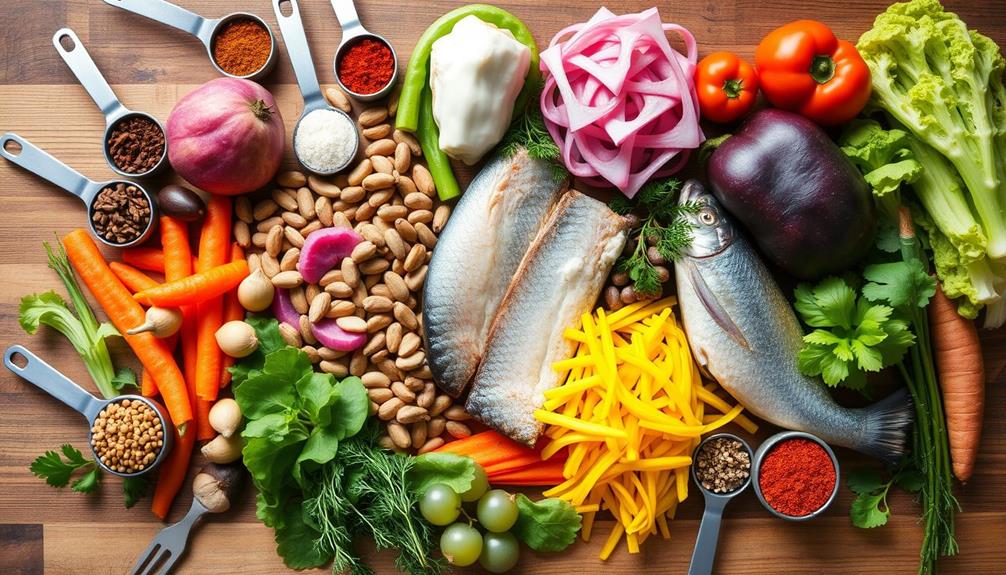
Essential nutrients play a pivotal role in your success on the keto diet, as they help maintain energy levels and prevent deficiencies. One of the key keto diet basics is ensuring that you are getting enough essential nutrients, such as magnesium, potassium, and vitamin C, which can often be lacking on a low-carb diet. Making sure to incorporate a variety of whole, nutrient-dense foods into your meals can help ensure that your body is receiving all the essential nutrients it needs to thrive on the keto diet. Additionally, considering supplementation may also be necessary to bridge any nutrient gaps and support overall health while following the keto diet.
You'll need to focus on both macronutrients and micronutrients. Healthy fats are critical for energy during ketosis, while protein supports muscle preservation and satiety.
Don't forget fiber; it aids digestion and helps manage cravings. Additionally, electrolytes like sodium, potassium, and magnesium are fundamental for maintaining fluid balance and preventing fatigue.
It's also important to take into account antioxidant-rich foods, such as celery juice, that can support overall health on your keto journey.
Micronutrients such as B vitamins and vitamin D are crucial for overall health.
Importance of Nutrients
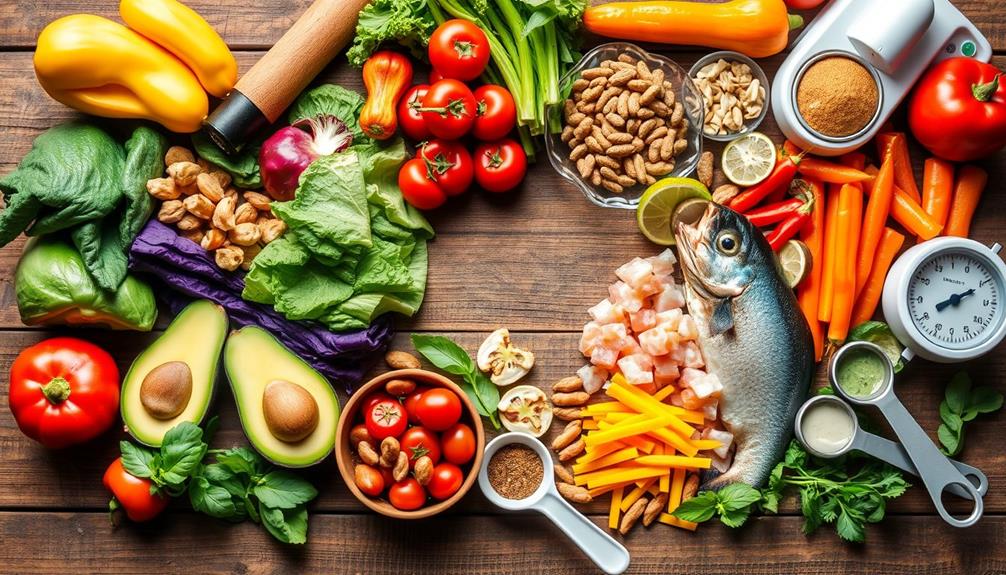
Prioritizing nutrient intake on the keto diet directly impacts your health and weight loss journey. Essential nutrients not only support your calorie goals but also prevent deficiencies that can hinder your progress.
Healthy fats are vital for energy production and metabolic reactions, while protein helps promote satiety, curbing cravings effectively. An imbalance of nutrients might leave you feeling fatigued and less motivated.
Regular health assessments can help guarantee you're getting the right balance, ultimately enhancing your overall wellness. By focusing on nutrient-dense foods, you can maintain energy levels and support peak metabolic functions.
Key Nutrients for Beginners
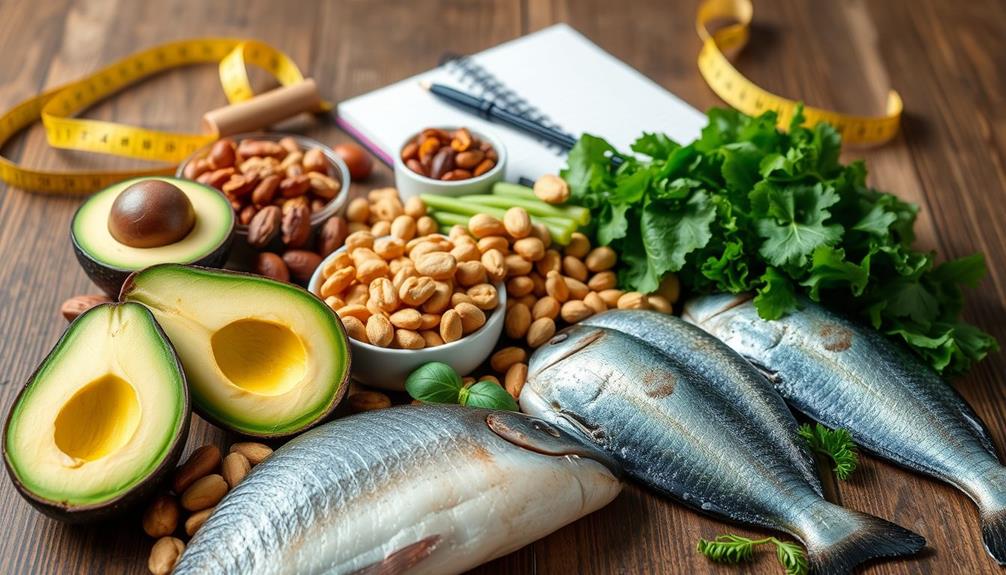
Starting your keto journey means understanding the key nutrients that will support your success. Focus on these essential nutrients to enhance your experience:
- Healthy Fats: Prioritize sources like avocados, nuts, and olive oil for energy and overall health.
- Protein: Aim for high-quality options like meat, fish, and eggs to preserve muscle and curb cravings.
- Fiber: Incorporate leafy greens, chia seeds, and avocados to aid digestion and manage hunger.
- Electrolytes: Keep your sodium, potassium, and magnesium levels in check to prevent fatigue and cramps.
These nutrients are crucial for maintaining energy levels, promoting satiety, and ensuring your body functions efficiently on the keto diet.
Embrace them for a smoother shift into ketosis!
Hydration and Monitoring Intake

Hydration plays an essential role in your keto journey, as it supports digestion, metabolic function, and overall health. During ketosis, your body loses more water, so you need to increase your fluid intake to about 2 to 3 liters daily, depending on your activity level.
Make certain to include electrolytes like sodium, potassium, and magnesium in your diet to maintain balance and prevent common issues like fatigue and cramps.
To effectively track your nutrient intake, use food tracking apps like MyFitnessPal or Cronometer. Regularly evaluate your macronutrients and confirm you're meeting your dietary goals.
Monitoring your hydration and nutrient levels not only aids in achieving ketosis but also enhances your overall well-being throughout your keto journey.
Addressing Nutrient Deficiencies

Nutrient deficiencies can sneak up on you during a keto diet, impacting your energy levels and overall well-being.
To stay on track, it's crucial to recognize and address these potential gaps in your nutrition. Here are four common deficiencies to watch for:
- Magnesium: Important for muscle function and energy production.
- Potassium: Helps maintain fluid balance and prevents cramps.
- Vitamin D: Supports immune function and bone health.
- B Vitamins: Essential for energy metabolism and cognitive function.
Incorporating a variety of nutrient-dense foods into your meals can help you avoid these deficiencies.
Focus on leafy greens, nuts, seeds, and fatty fish to boost your nutrient intake while enjoying your keto journey.
Role of Supplements in Keto
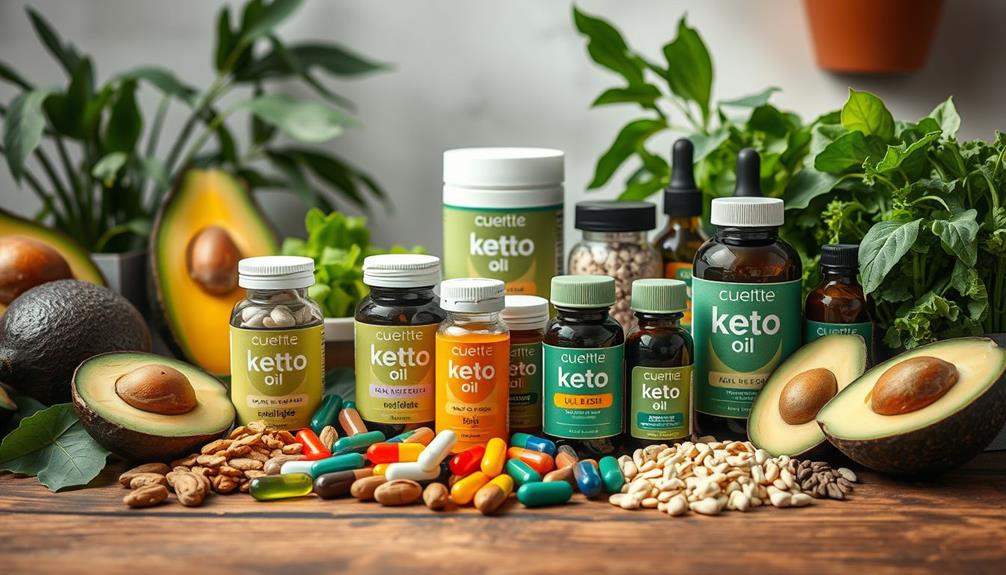
Supplements can play an essential role in ensuring you meet your nutritional needs while following a keto diet. Given the restrictive nature of keto, you might struggle to obtain all necessary vitamins and minerals from food alone. This is where supplements come in handy. They can help fill gaps, particularly for magnesium, potassium, and vitamins B and D, which are often lacking.
Consider electrolyte supplements to combat imbalances that can lead to fatigue and cramps. High-quality omega-3 supplements can also support heart health.
Always choose third-party tested products for quality assurance, and consult with a healthcare professional to tailor your supplementation plan to your individual needs. This way, you'll enhance your keto journey and maintain peak health.
Frequently Asked Questions
Can I Follow a Keto Diet as a Vegetarian or Vegan?
Yes, you can follow a keto diet as a vegetarian or vegan. Focus on plant-based fats, low-carb veggies, and high-quality protein sources like nuts, seeds, and tofu to meet your nutritional needs effectively.
How Does Keto Impact Athletic Performance and Endurance?
So, you think eating copious amounts of bacon will turn you into an Olympic athlete? Well, buckle up! Keto can boost endurance, but it's not a miracle. Balance your fats, carbs, and protein for peak performance.
What Snacks Are Keto-Friendly and Nutrient-Dense?
When choosing keto-friendly snacks, opt for nutrient-dense options like avocados, cheese, nuts, and hard-boiled eggs. These snacks provide healthy fats, protein, and essential vitamins, keeping you satisfied while supporting your dietary goals.
Can I Drink Alcohol While on a Keto Diet?
Yes, you can drink alcohol on a keto diet, but choose low-carb options like dry wine or spirits. Just be mindful of portion sizes, as alcohol can impact ketosis and overall energy levels.
How Do I Know if I'm in Ketosis?
Knowing if you're in ketosis feels like finding the light in a dark room. You'll notice reduced hunger, increased energy, and a sweet, metallic taste in your mouth. Testing ketone levels confirms your state.
Conclusion
As you navigate your keto journey, remember that fueling your body with the right nutrients is key to revealing your success. Just like a knight needs a trusty sword, you need essential vitamins and minerals to conquer cravings and maintain energy. Embrace healthy fats, stay hydrated, and don't shy away from supplements if needed. With the right balance, you'll not only thrive in ketosis but also enjoy the adventure of transforming your health. Keep pushing forward!
Nutritional Information
Is Keto Diet Good for High Blood Pressure
With the potential to lower blood pressure, the keto diet raises questions about its safety and effectiveness—find out what you need to know.

The keto diet can be beneficial for high blood pressure. It promotes weight loss, which is essential for lowering blood pressure levels. Many studies have shown participants achieving significant blood pressure reductions while following this low-carb, high-fat diet. Additionally, as your body enters ketosis, insulin levels drop, aiding in fat burning and reducing sodium retention. However, it's important to monitor your electrolyte levels closely and consult a healthcare professional, as individual responses can vary. If you're curious about how to implement this diet safely and effectively, there's more to discover about its long-term benefits and considerations.
Key Takeaways
- The keto diet may lower blood pressure through weight loss and reduced carbohydrate intake, promoting better cardiovascular health.
- Ketogenic diets can improve insulin sensitivity, which helps regulate blood pressure levels effectively.
- Emphasizing whole foods and low-glycemic options in the keto diet supports overall heart health and may reduce hypertension risks.
- Regular monitoring of sodium and potassium intake is crucial to prevent imbalances that could negatively affect blood pressure.
- Consulting healthcare professionals before starting the keto diet is essential for tailored guidance and to manage individual health needs.
Overview of the Keto Diet
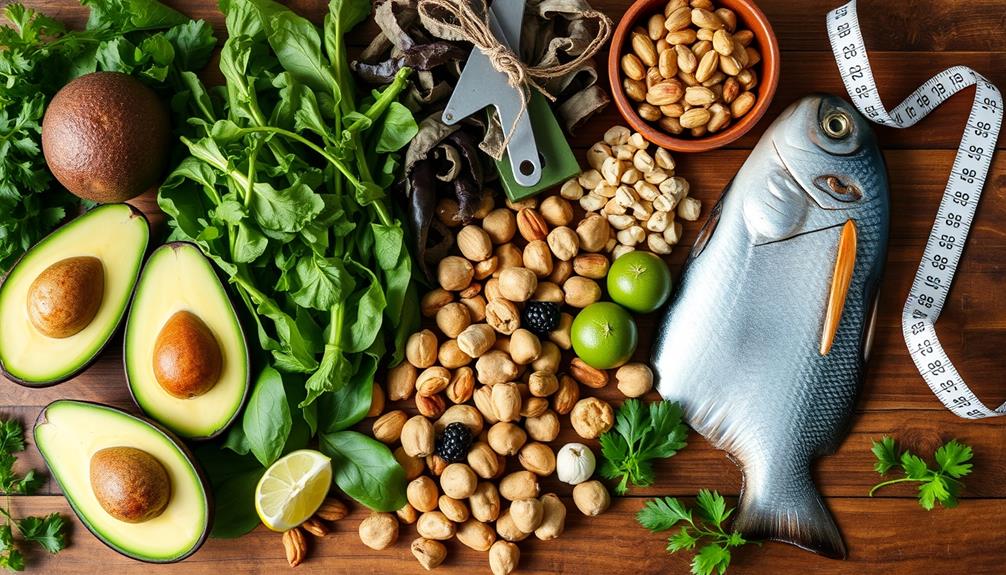
Understanding the ketogenic diet can be a game-changer for those looking to improve their health. The keto diet is a high-fat, low-carbohydrate approach, typically consisting of 70-75% of calories from fat, 20-25% from protein, and only 5% from carbohydrates.
Originally developed for managing epilepsy, this diet has gained traction for its potential benefits in weight loss and metabolic health. Additionally, it's crucial to acknowledge that diets high in antioxidants, such as those found in celery juice, may complement the keto approach by enhancing overall health.
By inducing a state called ketosis, your body shifts from burning carbohydrates for fuel to burning fat, enhancing your fat-burning capabilities. This shift can be particularly beneficial for those facing issues with high blood pressure, diabetes, and heart health. The ketogenic diet may help with lowering blood pressure and improving cholesterol levels, especially in individuals dealing with obesity.
However, it's essential to recognize that the diet restricts many food groups, including fruits and grains, which can lead to nutrient deficiencies if not managed properly.
If you're contemplating adopting a ketogenic diet, be aware of these potential risks while focusing on the health benefits it can offer, especially for weight loss and metabolic improvements related to heart health.
Understanding High Blood Pressure
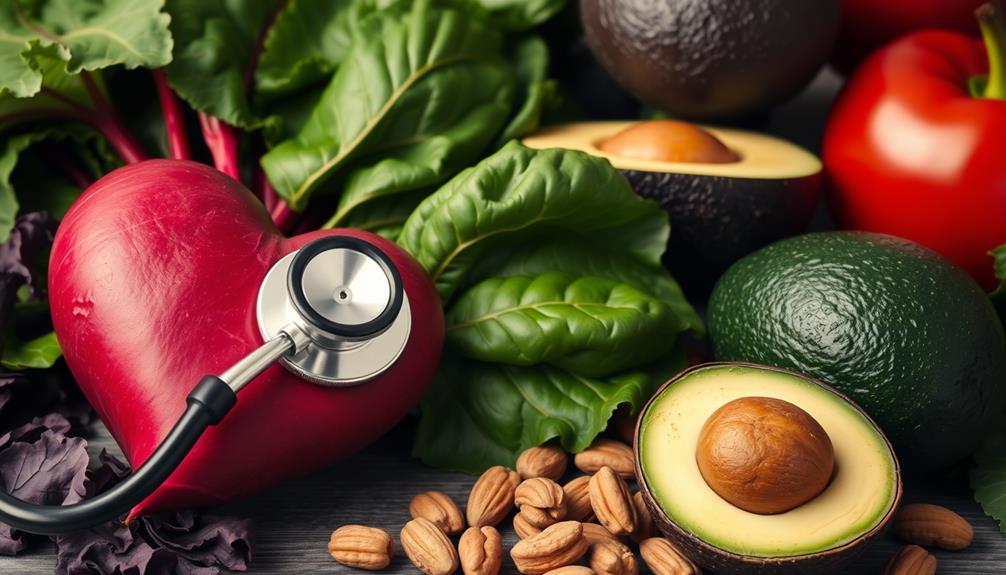
High blood pressure, or hypertension, affects about one-third of Americans and can greatly impact your overall health. Defined as a systolic reading of 130 mmHg or higher, or a diastolic reading of 80 mmHg or higher, hypertension often stems from factors like obesity, sedentary lifestyle, and poor dietary choices.
To help you better understand hypertension, here's a quick reference table:
| Category | Blood Pressure (mmHg) |
|---|---|
| Normal | <120 / <80 |
| Elevated | 120-129 / <80 |
| High | ≥130 / ≥80 |
Chronic high blood pressure can lead to severe health risks, including heart disease, stroke, and kidney damage. This makes regular monitoring essential. You can take charge of your cardiovascular health by adopting a healthy lifestyle. Focus on balanced nutrition, maintain a healthy weight, and get regular physical activity. Be mindful of your cholesterol levels and sodium intake, as these dietary choices greatly impact your blood pressure management. Embracing these changes can provide you with a better chance of keeping hypertension at bay and improving your overall well-being.
Keto's Impact on Blood Pressure
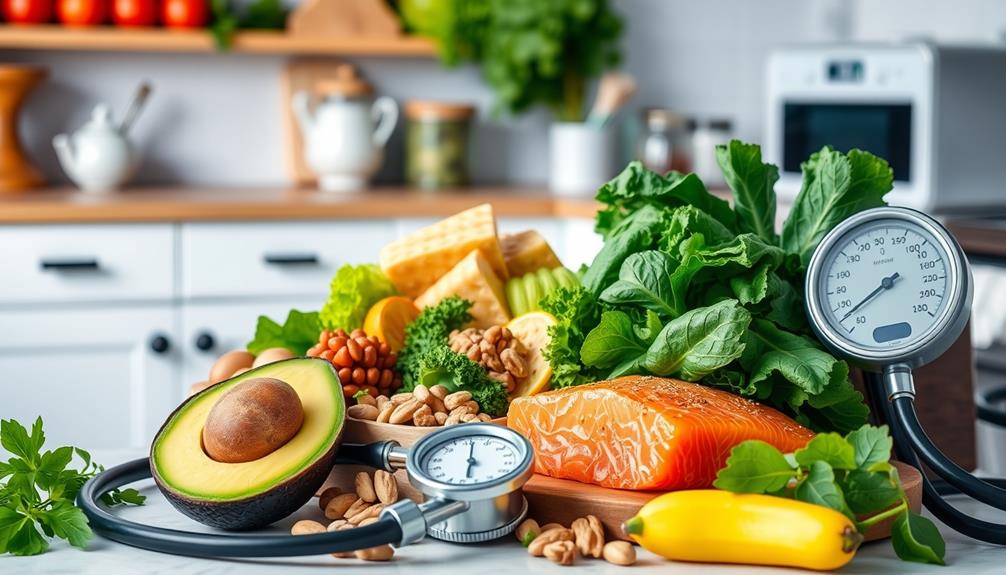
When you start the ketogenic diet, you might notice changes in your blood pressure due to various mechanisms like appetite suppression and reduced inflammation.
The emphasis on whole foods and low-glycemic options can further support your overall health during this change effective strategies for weight loss.
It's crucial to reflect on your nutritional intake carefully, especially regarding sodium and potassium levels, as these can affect your blood pressure.
Also, be aware of the risks involved and monitor your response closely, since individual reactions to the diet can vary greatly.
Mechanisms of Blood Pressure Reduction
The ketogenic diet has a profound impact on blood pressure reduction through several key mechanisms. One major factor is weight loss; studies reveal that individuals who adopt a low-carb diet like keto experience significant drops in both systolic and diastolic blood pressure. As you shed pounds, your body can better regulate blood pressure, which is essential for managing hypertension.
Additionally, maintaining a healthy weight can help reduce the risk of other conditions related to high blood pressure, such as tick-borne disease prevention and cardiovascular issues.
Another mechanism is the reduction of insulin levels. When you're in ketosis, lower insulin levels promote fat burning and suppress appetite, helping you maintain a healthier weight and further reduce blood pressure.
Additionally, research shows that low-carb diets may lower arterial inflammation, contributing to better cardiovascular health overall.
Compared to traditional low-fat diets, the ketogenic diet has proven more effective in reducing blood pressure, with participants reporting greater improvements.
By focusing on whole, nutrient-dense foods and minimizing refined carbohydrates, the keto diet can also help balance potassium intake, which is essential for blood pressure regulation.
Together, these mechanisms highlight how the ketogenic diet can be a powerful tool in managing blood pressure and supporting cardiovascular health.
Nutritional Considerations for Keto
Many people find that understanding nutritional considerations on the ketogenic diet can greatly impact blood pressure management. The keto diet emphasizes healthy fats from sources like olive oil, avocados, and nuts, which not only support heart health but also help in managing blood pressure.
Incorporating leafy green vegetables is fundamental to prevent nutrient deficiencies, particularly potassium, as it's essential for blood pressure regulation. Additionally, adopting a budget plan for grocery shopping can help guarantee you're purchasing high-quality, nutrient-dense foods that align with your health goals.
Monitoring your sodium intake is critical on the keto diet. An overload of sodium can elevate blood pressure, while insufficient potassium can exacerbate hypertension. Striking a balance between these two minerals is fundamental for maintaining healthy blood pressure levels.
Research shows that low-carb, high-fat diets like keto can lead to significant reductions in both systolic and diastolic blood pressure, especially for those with obesity or hypertension.
Regular consultations with healthcare professionals are recommended while following the keto diet to guarantee you're getting adequate nutrients and effectively monitoring your blood pressure levels.
Risks and Monitoring Needs
Understanding the potential risks and monitoring needs associated with the ketogenic diet is essential, especially concerning blood pressure. While Keto diets can initially help reduce blood pressure, some individuals may experience elevated levels due to electrolyte imbalances. It's important to monitor these changes, particularly if you have pre-existing hypertension.
Many individuals find that appropriate investment strategies in precious metals can also help manage financial stress during dietary changes.
Maintaining a balance of sodium and potassium is significant while following the keto diet. Low potassium levels can exacerbate high blood pressure, especially if sodium intake isn't carefully managed. Additionally, electrolyte imbalances from excessive water consumption can hinder blood pressure regulation, making appropriate supplementation and dietary adjustments necessary.
Initial studies suggest that the keto diet can lower blood pressure in obese individuals, but the long-term benefits may diminish. As a result, ongoing monitoring by healthcare professionals is recommended to assess how your blood pressure responds to the diet.
Regular check-ins will help you manage any adverse effects and make necessary lifestyle adjustments. By staying proactive about your health, you can better navigate the complexities of the keto diet and its impact on hypertension.
Mechanisms of Blood Pressure Regulation

Regulating blood pressure involves a complex interplay of factors, and the ketogenic diet can play a significant role in this process. One of the primary mechanisms is weight loss, a vital factor in reducing hypertension risk. As you shed pounds, your body mass index (BMI) decreases, which can lead to lower blood pressure readings.
In addition, understanding tax implications of dietary choices may also help in making informed health decisions.
The ketogenic diet also lowers insulin levels, resulting in decreased sodium retention. This promotes the excretion of excess sodium, additionally aiding in blood pressure regulation.
Moreover, studies show that low-carbohydrate diets like keto can reduce arterial inflammation, a significant contributor to elevated blood pressure.
You may find that following a ketogenic diet suppresses your appetite and increases energy expenditure, which leads to reduced caloric intake. This decrease in calories not only helps with weight loss but also contributes to improvements in your blood pressure.
Research indicates that individuals on the ketogenic diet have experienced notable reductions in both systolic and diastolic blood pressure, enhancing their overall cardiovascular health.
Benefits of Weight Loss on Hypertension

When you lose weight, you can greatly lower your blood pressure, with even a small drop of 5-10% making a difference.
The ketogenic diet's low-carb approach helps you shed pounds quickly, which can enhance your heart health in the long run.
Understanding financial considerations related to healthy living can also play a role in supporting your weight loss journey.
Mechanisms of Weight Loss
Weight loss can greatly impact blood pressure, especially for those following a ketogenic diet. When you shed those extra pounds, you can experience significant improvements in your overall health.
Significantly, many individuals seek out investment strategies to secure their financial future while improving their health, such as investing in precious metal IRAs.
Here are three key mechanisms through which weight loss benefits hypertension:
- Decreased Insulin Levels: As you lose weight, your insulin levels tend to drop. Lower insulin enhances fat burning, helping you manage obesity, a primary risk factor for high blood pressure.
- Reduced Arterial Inflammation: Weight loss contributes to decreased inflammation in your arteries. This reduction enhances blood flow and lowers blood pressure, promoting better cardiovascular health.
- Improved Lipid Profile: Following a ketogenic diet can lead to reduced triglycerides and LDL cholesterol levels. These improvements are vital for managing hypertension and reducing cardiovascular risks.
Long-term Health Impact
Significant long-term health benefits come from weight loss, especially regarding hypertension. The ketogenic diet can help you achieve sustained weight loss, leading to substantial reductions in both systolic and diastolic blood pressure. Studies show that individuals who lose weight through this diet often see improved blood pressure levels, which can reduce your hypertension risk over time.
Additionally, as the demand for AI cybersecurity jobs increases, professionals in this field may find that improving health outcomes can lead to enhanced performance in their roles due to better overall well-being.
One of the key advantages of weight loss via the ketogenic diet is improved insulin sensitivity. Better insulin regulation helps your body manage blood pressure more effectively, thereby supporting cardiovascular health. As you lose weight, you may also find that you rely less on antihypertensive medications, as your blood pressure stabilizes.
Long-term adherence to the ketogenic diet, complemented by regular physical activity, amplifies these benefits. This combination not only enhances weight loss but also contributes to ongoing improvements in blood pressure management.
Ultimately, committing to a ketogenic lifestyle can be a powerful strategy for reducing hypertension risk and promoting overall well-being. So, if you're considering the ketogenic diet, remember that the long-term health impacts on your blood pressure can be significant and rewarding.
Potential Risks of the Keto Diet

Steering through the potential risks of the keto diet is essential, especially for those concerned about high blood pressure. While some may experience initial benefits, several factors could lead to long-term health complications. Here are three key risks to take into account:
1. Increased LDL Cholesterol: The keto diet can elevate LDL cholesterol levels, which may heighten the risk of heart disease, a significant concern for anyone managing high blood pressure.
Additionally, it's crucial to recognize that top-rated heat pumps can provide ideal comfort in varying weather conditions, highlighting the importance of overall health management.
2. Electrolyte Imbalances: Following a strict keto diet can disrupt the balance of electrolytes, particularly sodium and potassium. This imbalance might adversely affect blood pressure regulation, leading to further complications.
3. Nutrient Deficiencies: Extreme carbohydrate restriction often limits the intake of fruits and vegetables, increasing the risk of nutrient deficiencies. These deficiencies can negatively impact heart health and blood pressure management.
If you're on anticoagulant medications, like warfarin, tread carefully. The vitamin K in leafy greens may interfere with these drugs, complicating your health management.
Always consult with a healthcare professional before making significant dietary changes, especially with high blood pressure in the mix.
Role of Physical Activity

How can physical activity transform your approach to managing high blood pressure on a keto diet? Engaging in regular exercise is vital for lowering blood pressure and enhancing your overall health. Guidelines recommend at least 150 minutes of moderate aerobic exercise each week, which can greatly benefit individuals dealing with hypertension.
By combining this physical activity with the ketogenic diet, you can achieve remarkable weight loss, further supporting your blood pressure management.
Aerobic activities, like walking or cycling, alongside resistance training, work wonders in reducing both systolic and diastolic blood pressure levels. If you've been leading a sedentary lifestyle, incorporating physical activity into your daily routine is essential.
Not only does it help lower blood pressure, but it also boosts insulin sensitivity, a key factor in managing your health, especially on a keto diet.
Incorporating exercise into your lifestyle can empower you to take charge of your hypertension. With consistent effort, you'll notice positive changes in your blood pressure, energy levels, and overall well-being.
Recommendations for Safe Practice

When starting on the keto diet, it's important to prioritize safety, especially if you have high blood pressure. To make sure you're on the right track, follow these recommendations:
- Consult Your Doctor: Before diving into the diet, talk to your healthcare professional. They can assess potential risks and tailor the diet to fit your specific health needs.
- Regular Monitoring: Keep a close eye on your blood pressure and electrolyte levels. The keto diet can cause imbalances that might worsen hypertension, so regular check-ins are significant.
- Focus on Whole Foods: Emphasize unprocessed foods like healthy fats, lean proteins, and low-carb vegetables. This approach not only supports your diet but also helps maintain adequate potassium intake, which is critical for regulating blood pressure.
Incorporating regular physical activity alongside your keto diet can further enhance cardiovascular health and support blood pressure management.
Frequently Asked Questions
Can I Do Keto With High Blood Pressure?
You can try the keto diet, but it's essential to monitor your blood pressure regularly. Consult your healthcare professional beforehand to guarantee it's safe and tailored to your specific health needs and conditions.
Does Cutting Out Carbs Help Blood Pressure?
Wondering if cutting out carbs helps blood pressure? It can! Reducing carbs often leads to weight loss and improved insulin levels, which may lower arterial inflammation and ultimately support better blood pressure management for you.
Are Carbs OK for High Blood Pressure?
Carbs can be okay for high blood pressure, especially when they come from whole foods like fruits and vegetables. Focus on quality, balance your intake, and pair them with potassium-rich options to support your health.
Is Keto Good or Bad for Your Heart?
When it comes to your heart, keto's like a double-edged sword. It might help with weight loss, but it could also raise LDL cholesterol. You'll want to monitor your health closely and consult a professional.
Conclusion
Just like a ship steering through stormy seas, your health journey requires careful guidance. The keto diet can be a helpful compass for managing high blood pressure, directing you toward weight loss and improved well-being. However, it's essential to check your sails—balance is key. Incorporating physical activity and consulting with a healthcare professional guarantees you're not lost at sea. With the right tools and knowledge, you can chart a course to calmer waters and a healthier life.
Nutritional Information
Best Keto Breakfast Before a Workout: Fuel Your Performance
Discover the ultimate keto breakfast to supercharge your workout performance and unlock the secrets to optimal energy levels. Are you ready to elevate your routine?

To fuel your performance on a keto diet, start with a breakfast rich in healthy fats and moderate protein. Options like avocado with eggs or a keto coffee smoothie can provide sustained energy without spiking your blood sugar. Aim to eat 30-60 minutes before your workout for peak digestion. Don't forget about hydration and electrolyte balance—aim for 3,000-5,000 mg of sodium daily to keep your muscles functioning well. Experiment with your meal timing to see what works best for your body. There's more to explore about maximizing your pre-workout fuel and enhancing your overall performance.
Key Takeaways
- Focus on healthy fats and moderate protein for sustained energy, like avocado with eggs or MCT oil coffee.
- Consume pre-workout meals 30-60 minutes prior to exercise for optimal digestion and performance.
- Experiment with meal timing; larger meals may be needed 1-2 hours before intense workouts.
- Stay hydrated and maintain electrolyte balance, aiming for 3,000-5,000 mg of sodium daily.
- Consider supplements like caffeine and beta-alanine to enhance fat oxidation and reduce fatigue during workouts.
Understanding Ketosis

When you shift your diet to a low-carb, high-fat approach, your body enters a state known as ketosis. This metabolic state occurs when you considerably reduce carbohydrate intake, prompting your liver to produce ketones. These ketones become your body's primary energy source, allowing you to efficiently burn fat for fuel instead of relying on carbs.
As you adapt to the keto diet, you'll likely notice increased energy levels and improved exercise performance.
During ketosis, your body is optimized for fat burning, enabling you to tap into stored fat more effectively. This means that while exercising, you could burn approximately twice as much fat compared to individuals on a high-carb diet.
Additionally, ketosis supports muscle function, which is essential for maintaining strength during workouts.
Understanding ketosis is important for your pre-workout nutrition. By maximizing the energy derived from fat, you can enhance your overall performance and endurance.
The more you embrace this low-carb lifestyle, the better your body becomes at utilizing ketones, leading to sustained energy and improved results during physical activities.
Pre-Workout Nutrition Essentials

Pre-workout nutrition plays an essential role in how well you perform during your workouts. To optimize your energy levels and endurance, focus on a pre-workout meal that aligns with the ketogenic diet. This means incorporating healthy fats and moderate protein into your routine. Options like MCT oil coffee or avocado with eggs can provide you with sustained energy without disrupting ketosis.
Aim to eat your pre-workout snack 30-60 minutes before exercising. This timing allows for proper digestion, guaranteeing that your body has the energy it needs for workout performance. Healthy fats, such as nuts or cheese, are critical for maintaining steady energy levels without causing blood sugar spikes, particularly important for low-carb workouts.
Hydration is another essential component of pre-workout nutrition. Verify you're drinking enough water and maintaining your electrolyte balance, especially sodium intake, which should be between 3,000-5,000mg daily.
Proper hydration supports muscle function and overall performance, helping you push through even the toughest workouts. By paying attention to these pre-workout nutrition essentials, you'll set yourself up for success every time you hit the gym.
Top Keto Breakfast Ideas

Starting your day with a keto-friendly breakfast can fuel your workouts and keep you in ketosis. Here are some top keto breakfast ideas you can eat before a workout to guarantee you have the right energy source.
The Keto Coffee Smoothie is a fantastic choice. Blend MCT oil, unsweetened almond milk, and a scoop of keto-friendly protein powder for a high-fat, energizing breakfast.
If you're craving something savory, try Avocado and Eggs. Half an avocado paired with two hard-boiled or scrambled eggs offers healthy fats and protein, keeping you satisfied and energized.
For a creamy option, go with a Greek Yogurt Parfait. Use unsweetened Greek yogurt topped with nuts and seeds for a low-carb, protein-packed meal.
Alternatively, Chia Seed Pudding can be a great pre-workout meal. Mix chia seeds with coconut milk and a low-carb sweetener, letting it set overnight for a fiber-rich breakfast that'll help fuel your body.
Lastly, don't forget about Keto Cloud Bread. This low-carb bread made with eggs and cream cheese can be topped with nut butter or cheese, making it a satisfying option that aligns with your keto goals.
Timing Your Breakfast

Timing your keto breakfast can greatly impact your workout performance. To optimize your energy levels and digestion, aim to consume your breakfast 30-60 minutes before your workout. However, if you're planning a longer or more intense session, consider having a larger meal 1-2 hours prior to guarantee you have sustained energy and nutrient availability.
It's important to remember that individual digestion times can vary. Some may perform better with a quick pre-workout snack closer to their workout, while others might need more time to digest a meal. Adjust your portion sizes based on your workout intensity: lighter sessions may require smaller snacks, while intense training calls for more substantial meals. Experiment with different timing strategies to find what works best for your body and energy levels during workouts.
Here's a simple guide to help you decide on your meal timing:
| Timing | Meal Type | Best For |
|---|---|---|
| 30-60 minutes | Pre-workout snack | Lighter workouts |
| 1-2 hours | Substantial meal | Longer, intense workouts |
| Adjust as needed | Varies | Individual preferences |
Supplements to Enhance Performance
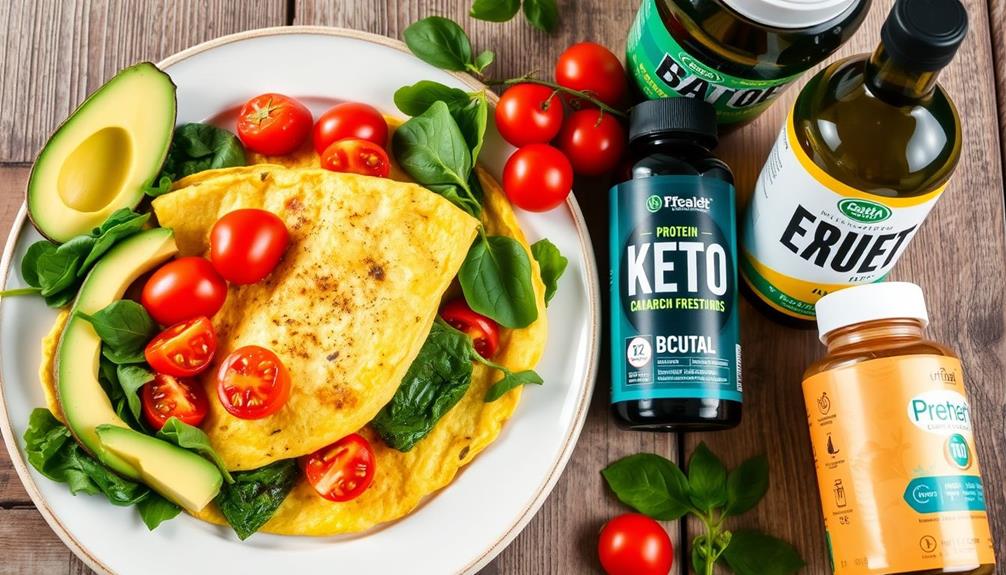
To boost your workout performance, consider key supplements like caffeine and creatine that can make a real difference.
Timing your intake is essential for getting the most benefits, so plan accordingly.
Also, assess your individual needs to tailor your supplement strategy for best results.
Key Performance-Enhancing Ingredients
When gearing up for a workout, incorporating key performance-enhancing supplements can make a significant difference in your overall performance.
Caffeine, for instance, can provide an energy boost with just 200 mg, enhancing fat oxidation, endurance, and muscle strength. It's a game-changer for high-intensity workouts.
Creatine monohydrate is another top choice, known for increasing muscle mass and strength, especially beneficial during heavy lifts or HIIT sessions.
You might also consider beta-alanine; taking 4-6 grams daily helps buffer lactic acid, reducing fatigue and improving performance in prolonged workouts.
L-Citrulline is worth adding to your routine too. This supplement enhances blood flow and nutrient delivery to your muscles, which can boost endurance and minimize post-exercise soreness.
Timing for Optimal Results
Optimizing your performance involves not only the right supplements but also knowing when to take them. A pre-workout meal consumed 30-60 minutes before your workout allows for ideal digestion and energy production.
Consider incorporating MCT Oil Powder into this meal; taking it about 30 minutes prior can provide quick energy and boost ketone levels, making it an effective choice for keto dieters.
If you're engaging in high-intensity workouts, a small serving of fast-digesting protein, like a protein shake, can support muscle maintenance and recovery. Aim to consume this about 30 minutes before you hit the gym.
Additionally, caffeine can enhance alertness and fat burning, so taking around 200 mg 30 minutes prior can further elevate your performance.
Hydration is essential, so drink water leading up to your workout, and consider electrolyte supplements if you plan to train for over an hour.
Individual Needs Assessment
Evaluating your individual needs for pre-workout supplements is vital for maximizing performance and achieving your fitness goals. Your requirements can vary based on workout intensity, duration, and personal energy levels.
For high-intensity training, consider incorporating around 200 mg of caffeine to enhance alertness and promote fat for fuel. This can lead to significant improvements in your workout performance.
To combat muscle fatigue and boost endurance during prolonged workouts, beta-alanine can be advantageous. Aim for a daily intake of 4-6 grams.
Additionally, L-Citrulline can support increased blood flow and nutrient delivery to your muscles, especially during high-repetition exercises, enhancing your endurance further.
Don't overlook the importance of electrolyte balance in pre-workout nutrition. It's essential to consume between 3,000-5,000 mg of sodium daily, along with adequate potassium and magnesium from keto-friendly foods.
This will help prevent muscle cramps and guarantee peak function, allowing you to perform at your best. By evaluating your individual needs and tailoring your supplement intake accordingly, you can better support your energy levels and overall workout performance.
Listening to Your Body

Understanding your body's signals about hunger and energy levels is essential for fine-tuning your pre-workout nutrition on a keto diet. Listening to your body helps you identify what fuels your performance best.
Start by keeping a food diary to track how different pre-workout snacks affect your workouts. This will enable you to notice patterns in energy levels and workout intensity.
Experiment with timing, as the ideal window for pre-workout meals can range from 30 minutes to 3 hours before exercise. You'll find what works best for you by monitoring your workouts and adjusting accordingly.
If you notice your energy dips, consider altering your snacks or the timing of your meals.
Don't forget to factor in your personal preferences. Enjoying your pre-workout meal can enhance motivation and adherence to the keto diet. Choose snacks that not only support your performance but also provide comfort.
Ultimately, the key is to listen to your body, make adjustments based on your findings, and find a routine that keeps you energized and ready to tackle your workouts head-on.
Frequently Asked Questions
What Do You Eat Before a Workout on Keto?
Before a workout on keto, you can eat avocado, nut butter, or hard-boiled eggs for energy. A protein shake with almond milk and spinach also boosts performance while keeping you in ketosis.
How to Fuel a Workout on Keto?
To fuel your workout on keto, prioritize high-fat, low-carb foods like avocado and eggs. Incorporate MCT oil for quick energy, and stay hydrated with water and electrolytes to enhance performance and prevent fatigue.
What Is the Best Fuel Before a Workout?
Before a workout, you'll want to fuel with high-fat, moderate-protein options like MCT oil, avocado, or hard-boiled eggs. Hydration's essential too, so drink water and consider electrolytes for ideal performance.
Should You Eat Keto Carbs Before or After Workout?
You should eat keto carbs after your workout to replenish glycogen stores and support recovery. Before exercising, focus on high-fat snacks for sustained energy. Listen to your body; it'll guide your carb timing perfectly.
Conclusion
As you lace up your shoes and feel the morning sun on your skin, remember that fueling your body with the right keto breakfast can ignite your performance. Picture yourself powering through that workout, energy surging with every rep. By embracing these tasty options and timing them just right, you'll transform your morning routine into a performance powerhouse. So, listen to your body, savor those flavors, and watch as you crush your fitness goals like never before!
Nutritional Information
Is Keto Diet Bad for Kidneys
Could the keto diet jeopardize your kidney health? Discover the surprising risks and essential insights that could change your perspective.

The keto diet can pose risks to your kidneys, especially if you have pre-existing kidney conditions. Its high protein intake can strain kidney function and may lead to issues like decreased glomerular filtration rate. Additionally, rapid weight loss associated with keto might cause dehydration and electrolyte imbalances. While the diet can improve certain health markers, monitoring kidney function is vital to avoid complications. If you're considering keto, professional guidance is essential to balance its benefits against potential kidney health risks. There's much more to understand about the keto diet and its effects on wellness.
Key Takeaways
- High protein intake on the keto diet may strain kidney function, particularly in individuals with existing renal conditions.
- Increased dietary acid load from protein can lead to metabolic acidosis, worsening kidney health.
- Regular monitoring of kidney function is essential for those on a ketogenic diet to prevent complications.
- Rapid weight loss associated with keto can cause dehydration and electrolyte imbalances, further impacting kidney health.
- Consulting healthcare professionals before starting the keto diet is crucial for managing risks to kidney health.
Understanding the Keto Diet
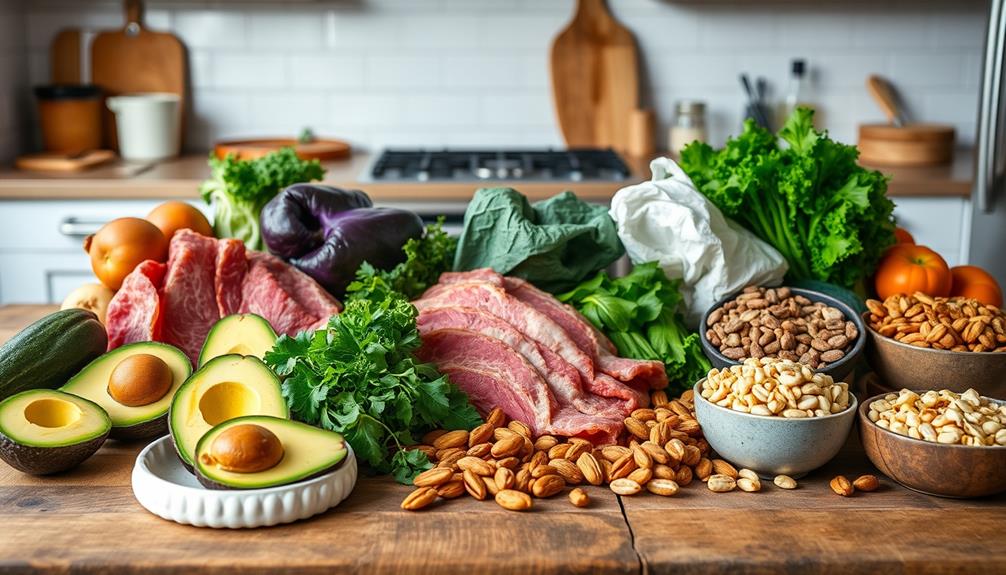
The keto diet's appeal lies in its unique approach to nutrition, emphasizing high fat intake while drastically reducing carbohydrates. Typically, this ketogenic diet consists of around 60% fat, 35% protein, and only 10% carbohydrates, limiting daily carbs to 20-50 grams to induce ketosis.
Originally developed for managing epilepsy, many people now turn to the keto diet for weight loss and metabolic health benefits. However, it's important to reflect on the balance of nutrients and potential health implications, especially regarding cold medications overview for those who may be taking medications while on the diet.
However, you should be cautious, especially if you have pre-existing renal conditions. The diet can lead to metabolic acidosis, increasing acid production that may negatively impact kidney function.
Additionally, the high protein intake associated with the keto diet can strain your kidneys. Research suggests a correlation between high-protein diets and decreased estimated glomerular filtration rate (eGFR), which is significant for evaluating kidney health.
If you're thinking about adopting the keto diet, it's critical to consult healthcare professionals. They can offer guidance tailored to your health needs and monitor your kidney function throughout the diet to guarantee you stay safe.
Understanding these potential risks can help you make informed decisions about your nutritional choices.
Effects on Kidney Function

When you follow a ketogenic diet, high protein intake can raise concerns for your kidney health.
Additionally, the high levels of antioxidants found in certain juices, such as cranberry juice, may offer some protective benefits for kidney function beneficial for overall health.
However, metabolic acidosis may also occur, putting extra strain on your kidneys and potentially worsening any existing conditions.
It's crucial to monitor your kidney function closely to avoid serious complications.
Protein Intake Concerns
High protein intake can raise red flags for kidney function, especially if you have pre-existing conditions. If you're following a ketogenic diet, it's essential to be aware that high protein consumption can strain your kidneys.
Studies have shown a correlation between high protein diets and a decreased estimated glomerular filtration rate (eGFR), which can signal declining kidney health. In addition, understanding financial considerations for elderly care can help in planning for potential health-related expenses in the future.
Population studies reveal that increased protein intake is linked to a 48% higher odds ratio for chronic kidney disease (CKD) progression over time. For individuals with solitary kidneys, limiting protein intake to 1.2 g/kg/day or less is advisable to prevent further complications.
A high protein diet can also lead to intraglomerular hypertension, potentially causing kidney injury and proteinuria. Moreover, the increased acid production from high protein and animal fat consumption in the ketogenic diet may contribute to metabolic acidosis, complicating kidney function even more.
If you're concerned about your kidney health, it's wise to monitor your protein intake and consult with a healthcare professional before committing to a ketogenic diet.
Acidosis and Kidney Health
Metabolic acidosis can greatly impact kidney health, especially for those on a ketogenic diet. The high dietary acid load from increased protein and animal fat intake may lead to a decline in kidney function over time. This condition is often associated with lower urinary citrate levels, which can increase your risk of developing kidney stones.
Additionally, understanding common financial terms related to health investments can provide insights into managing healthcare costs effectively.
If you're on a high-protein diet like keto, you might experience intraglomerular hypertension, contributing to kidney injury and proteinuria. Chronic metabolic acidosis can accelerate renal function decline, making it important to monitor your kidney health.
Moreover, untreated metabolic acidosis can heighten the risk of chronic kidney disease (CKD) in susceptible individuals. The complications associated with CKD, including renal bone disease and muscle wasting, can severely impact your overall health.
If you're considering or currently following a ketogenic diet, it's vital to be aware of these potential risks. Regular check-ups and kidney function tests can help you catch any issues early, ensuring that your diet supports your health without compromising your kidneys.
Protein Intake and Kidney Health

The relationship between protein intake and kidney health is essential, especially for those following a ketogenic diet. A high protein intake is common in keto, but it can lead to increased intraglomerular hypertension, which is linked to kidney injury and progressive chronic kidney disease (CKD).
Research shows that individuals on these diets have a 1.48 odds ratio for CKD progression, indicating a significant risk for renal function decline. To protect your financial health while managing dietary choices, it's important to take into account risk management strategies for investments as well.
The ketogenic diet typically recommends protein intake ranging from 0.6 to 1.4 g/kg, which can put a strain on kidney function. For those with advanced CKD, experts recommend limiting protein to 0.8 g/kg/day to protect renal function.
Additionally, increased acid production from high protein and animal fat consumption can worsen metabolic acidosis, further complicating kidney health.
If you have a solitary kidney, it's important to limit your protein intake to 1.2 g/kg/day or less to avoid excessive strain on your renal function. Being aware of these factors can help you make informed choices while following a ketogenic diet, ensuring that you prioritize your kidney health.
Weight Loss Vs. Kidney Risks
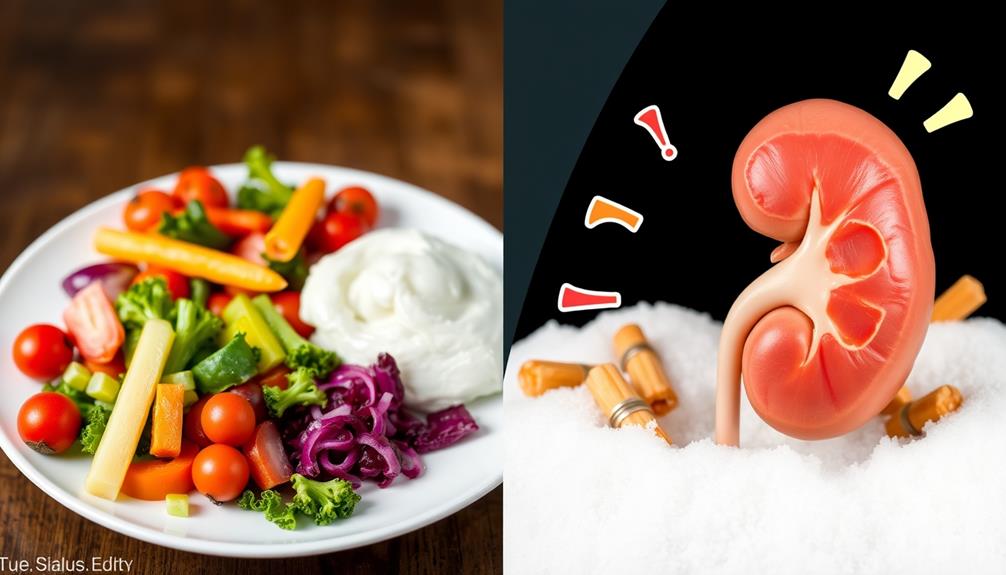
When pursuing weight loss on a ketogenic diet, it's important to weigh the benefits against potential kidney risks. The keto diet can lead to rapid weight loss, but it may also impose significant strain on your kidney function. Individuals with Borderline Personality Disorder (BPD) may experience additional challenges in managing their dietary choices, potentially complicating kidney health.
If you have pre-existing kidney conditions, the high protein intake often associated with the keto diet might exacerbate your renal impairment.
Here are some key considerations:
- High protein diets can decrease your estimated glomerular filtration rate (eGFR), worsening kidney function.
- Rapid weight loss can lead to dehydration and electrolyte imbalances, risking your overall health.
- Metabolic acidosis may worsen due to dietary choices, further stressing your kidneys.
- Monitoring kidney function is important, especially if you're at risk for chronic kidney disease.
- Professional guidance is critical for balancing weight loss goals with kidney health.
While the keto diet might help you shed pounds, it's important to think about your kidney health. The long-term effects of this diet on kidney function remain uncertain, so make sure to prioritize both your weight loss and kidney health for the best results.
Potential Health Benefits

If you're looking to improve your health, the ketogenic diet might offer some notable benefits.
It can enhance glycemic control and support weight loss, which are important for those at risk of chronic kidney disease.
Additionally, incorporating essential oils such as eucalyptus oil can further support respiratory health, which is critical for overall well-being.
Plus, the diet's anti-inflammatory effects could play a protective role for your kidneys.
Improved Glycemic Control
Adopting a ketogenic diet can greatly enhance your glycemic control, especially if you're dealing with type 2 diabetes. This diet focuses on carbohydrate restriction, which helps lower insulin levels and improves insulin sensitivity.
Additionally, improved health awareness about related conditions like breast cancer symptoms can motivate individuals to pursue healthier dietary choices. Studies show that individuals on a ketogenic diet experience a significant reduction in hemoglobin A1c levels, which is essential for managing blood sugar.
Here are some key benefits you might experience:
- Enhanced insulin sensitivity: This helps regulate blood sugar more effectively.
- Lower insulin levels: Carbohydrate restriction leads to better glucose regulation.
- Reduced risk of insulin resistance: This is critical for preventing further complications.
- Potential slowing of CKD progression: Improved glycemic control can protect kidney function in diabetic patients.
- Weight loss: While we're not diving into that now, it's significant to mention it supports overall health.
Weight Loss Benefits
The ketogenic diet's appeal often lies in its potential for weight loss, which can be particularly beneficial for those struggling with obesity or metabolic syndrome. If you're on a weight loss journey, this diet may help you shed pounds effectively. Studies show that following a ketogenic diet can lead to significant reductions in body weight and hemoglobin A1c levels, especially for individuals with type 2 diabetes.
Additionally, like a Gold IRA can provide a hedge against economic uncertainties, the ketogenic diet may offer a stable approach to weight management by reducing reliance on high-carb foods.
One of the key advantages of the ketogenic diet is its ability to improve glycemic control and reduce insulin resistance. By focusing on caloric restriction and a moderate protein intake, you can manage obesity and diabetes more effectively.
The rapid weight loss often observed can enhance overall health metrics, including blood pressure and cholesterol levels, positively impacting your cardiovascular health.
The ketogenic diet shifts your body's energy source from glucose to fat, promoting fat loss over time. This shift not only supports your weight loss goals but also fosters better metabolic health.
As you navigate your weight loss journey, the ketogenic diet can be a powerful tool, particularly if approached mindfully and with attention to your body's needs.
Reduced Inflammation Effects
One of the standout benefits of the ketogenic diet is its potential to reduce inflammation, which can be vital for kidney health. By incorporating this diet, you may experience significant improvements in inflammatory markers associated with chronic kidney disease.
Additionally, adopting a balanced diet rich in fruits and vegetables can further support kidney health and enhance the anti-inflammatory effects of the ketogenic approach, as suggested by lifestyle for longevity. The presence of ketone bodies, particularly beta-hydroxybutyrate (BHB), plays a significant role in this process.
Here are some key points to take into account:
- Reduced inflammation: BHB inhibits the activation of the NLRP3 inflammasome, lowering markers like IL-1β and TNF-α.
- Anti-inflammatory properties: The ketogenic diet may slow kidney disease progression by alleviating inflammatory responses, especially in diabetics.
- Oxidative stress management: BHB enhances antioxidant gene expression, promoting better kidney function.
- Protection against fibrosis: BHB's antifibrotic effects, mediated via the mTORC1 pathway, help protect kidney tissues.
- Lower inflammatory indicators: Clinical studies show that ketogenic diets can effectively reduce inflammation in type 2 diabetes patients, who are at high risk for kidney damage.
Monitoring Kidney Health

Regularly monitoring kidney health is important for anyone on a ketogenic diet, particularly if you have pre-existing kidney conditions. You need to assess any potential decline in kidney function, specifically the estimated glomerular filtration rate (eGFR) or increased proteinuria. Periodic blood tests to check creatinine and cystatin C levels are essential indicators of kidney health.
Monitoring electrolyte balance should also be a priority since a ketogenic diet can lead to fluctuations in sodium, potassium, and magnesium levels, which may complicate kidney health. Additionally, tracking your fluid intake is important to prevent dehydration, as rapid weight loss can trigger electrolyte imbalances.
Consulting with healthcare professionals, including nephrologists, can help you develop a personalized monitoring plan. Here's a quick reference table:
| Monitoring Aspect | Importance | Recommended Frequency |
|---|---|---|
| eGFR | Assess kidney function | Every 3 months |
| Proteinuria | Detect kidney damage | Every 6 months |
| Electrolyte Levels | Maintain balance for kidney health | Monthly |
| Fluid Intake | Prevent dehydration | Daily |
Dietary Alternatives for Kidney Care

Exploring dietary alternatives can greatly enhance kidney care, especially for those on a ketogenic diet.
By shifting your focus towards plant-based diets, you can lower the risks of metabolic acidosis while ensuring you get essential nutrients without overloading your kidneys.
Emphasizing whole foods can support your kidney function and overall health.
Here are some dietary alternatives to evaluate:
- Fruits and Vegetables: Rich in antioxidants and fiber, they promote renal health.
- Whole Grains: Provide necessary carbohydrates without harming kidney function.
- Healthy Fats: Incorporate sources like olive oil and avocados for balanced nutrition.
- Plant-Based Proteins: Substitute animal proteins with beans, lentils, or quinoa to manage high protein intake.
- Mediterranean Diet: Focus on omega-3 fatty acids and fiber to improve kidney health outcomes.
Consulting Healthcare Professionals

When considering dietary alternatives, it's crucial to consult healthcare professionals, especially before starting a ketogenic diet. If you have chronic kidney disease (CKD) or any kidney issues, a nephrologist can offer tailored advice on protein intake, which should generally be limited to 0.6-1.4 g/kg. This guarantees your dietary modifications won't worsen your renal condition.
Regular monitoring of your kidney function, including your estimated glomerular filtration rate (eGFR) and electrolyte levels, is important. This way, any adverse effects can be detected early. Collaborating with a dietitian experienced in renal nutrition can help you adhere to the ketogenic diet while making sure you meet your nutrient needs.
Here's a summary of key considerations:
| Aspect | Importance | Recommended Action |
|---|---|---|
| Protein Intake | Prevents kidney strain | Limit to 0.6-1.4 g/kg |
| eGFR Monitoring | Detects kidney function changes | Regular check-ups with healthcare pros |
| Metabolic Acidosis Risk | Complications from diet | Follow a well-formulated ketogenic diet |
| Dietary Modifications | Tailored to individual needs | Consult a nephrologist and dietitian |
Frequently Asked Questions
How Do I Protect My Kidneys on a Keto Diet?
To protect your kidneys on a keto diet, keep protein moderate, stay hydrated, monitor electrolyte levels, and regularly check kidney function. Always consult a healthcare professional to tailor your diet and minimize risks.
Does Keto Diet Harm Kidneys?
Like a double-edged sword, the keto diet can harm kidneys. It may strain function and increase stone risk, particularly if you have pre-existing conditions. Stay cautious, monitor health, and prioritize hydration while following this diet.
Is a Low-Carb Diet Good for the Kidneys?
A low-carb diet can benefit your kidneys by improving glycemic control and weight. However, if you're considering it, be cautious of high protein intake, as it might strain your kidneys over time. Balance is key.
What Is a Good Diet for Kidney Disease?
A good diet for kidney disease includes adequate protein, plenty of plant-based foods, and proper hydration. You should limit sodium, monitor potassium and phosphorus intake, and focus on balanced nutrients to support kidney health effectively.
Conclusion
In summary, while the keto diet can offer weight loss benefits, it may pose risks for your kidneys, especially if you have pre-existing conditions. Remember, "an ounce of prevention is worth a pound of cure." It's essential to monitor your kidney health and consult a healthcare professional before diving into any drastic dietary changes. By considering your individual needs and exploring kidney-friendly alternatives, you can find a balanced approach that works for you.
-

 Keto Recipes2 months ago
Keto Recipes2 months agoKeto Breakfast Ideas for Kids: Fun and Delicious Options
-

 Nutritional Information2 months ago
Nutritional Information2 months agoDairy: A Key Player in Nutrition
-
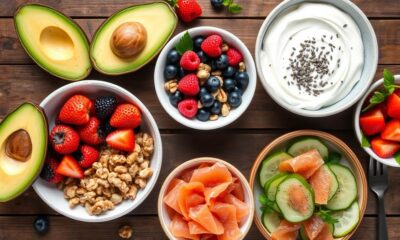
 Success Stories2 months ago
Success Stories2 months agoCold Keto Breakfast Ideas for a Refreshing Start
-

 Meal Prep Ideas3 months ago
Meal Prep Ideas3 months agoKeto Meal Prep Secrets for Busy Lives
-

 Success Stories2 months ago
Success Stories2 months agoBest Keto Breakfast Ideas You Need to Try Today
-

 Success Stories2 months ago
Success Stories2 months agoBest Fast Food Keto Breakfast Choices to Stay on Track
-

 Meal Prep Ideas2 months ago
Meal Prep Ideas2 months agoHow to Thicken Stew on Keto Diet
-

 Success Stories2 months ago
Success Stories2 months agoKeto Fast Food Breakfast Ideas That Won’t Break Your Diet
